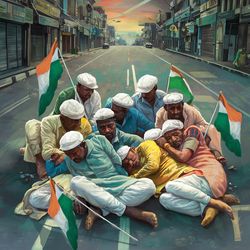Jayaprakash Narayan hadn’t expected his arrest on the night of June 25, 1975. Yet, when he saw two scribes, who were on a midnight prowl at the police station where he was quietly taken to, he told them, “Vinaash kaale vipareet buddhi.” The words proved prophetic. The imposition of Emergency, the midnight arrests of opposition leaders, and his utterance of that line of native wisdom contributed to Indira Gandhi’s undoing.
JP hadn’t prepared for the moment; he seized the moment.
Arvind Kejriwal had been expecting his arrest for weeks. He had defied the probe agency’s summons nine times, and had been telling all and sundry that he would soon hear the midnight knock. Yet when ‘they’ came for him, he didn’t have even a one-liner to give anyone.
Nor did his INDIAllies. Tax sleuths and enforcers have been making midnight knocks on every major opposition leader’s doors over the last few months. Even that didn’t galvanise the hunted to pack together and fight back.
Indeed, they have now rallied in protest, but a full 10 days after the AAP leader’s arrest. By then his persecutors had set a different electoral narrative, smearing him with Khalistani taint. The taint may wash off in the law courts, but by then much water would have flowed down Yamuna, and many million ballots would have been cast.
The story of India’s opposition since 2014 has been one of such missed opportunities. Flashback to the autumn of 2016, when the regime banned high-value bank notes, sending millions into miles-long queues of misery. In any democracy, that should have been a godsend for the opposition to mobilise the masses. They would have taken to the streets, marched into town squares, organised rallies and held sit-ins. A few would have played guardian angels, sent volunteers with bottles of party-labelled water bottles and food packets to the queued-up millions.
Not in India. Our opposition netas protested in Parliament, tweeted trolls, and used their credit and debit cards to pay their bills. They made statements of sympathy, but were absent in action. For the first time in India, both the government and the opposition let the people down.
Then came the spring of 2020, when the devil visited us in the form of an unknown virus. The government got vaccines made and sold, but goofed up the interim period playing Punch-and-Judy shows with plates and spoons and enforcing a short-sighted but long-lasting lockdown. Locked out of jobs and homes, thousands walked miles on bleeding feet to their country huts of misery, most of them starving, some fainting and a few falling dead.
Anywhere else in the democratic world, politicians would again have been out on the streets, protesting or providing succour to the needy, running roadside food camps, offering short rides in party-labelled cars or carts. Sadly again, the Indian opposition was conspicuous by its absence, as was an indifferent government.
A few months ago, every opposition member who opened his mouth in Parliament was thrown out of the house. The ousted 146 simply protested outside, and meekly walked back into the houses when called back. Contrast it to what happened on June 24, 1989. When the Rajiv Gandhi government white-washed the Bofors scandal with a parliamentary probe report, the entire opposition resigned en masse, and that became the rallying moment for an oust-Congress movement. They were just 73, yet enough to take on Rajiv’s 400-plus.
The opposition says, Modi has been crushing them. But haven’t they been allowing themselves to be crushed?
prasannan@theweek.in


